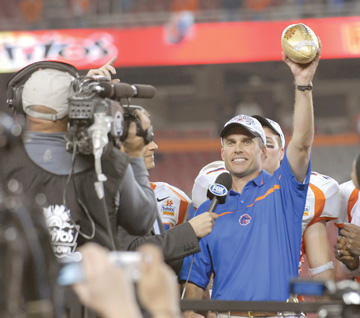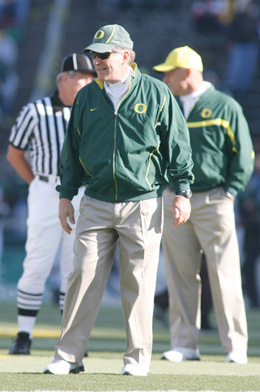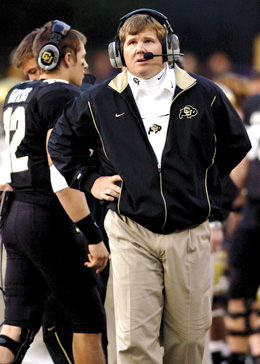Volume 25 · Number 1 · Fall 2007
Sports

Boise State’s Chris Petersen ’88, M.A. ’90, after his team’s victory in this year’s Fiesta Bowl.
UC Davis Breeds Coaching Success
UC Davis’ football program has been a training ground for top-level coaches.
Save for a few thousand Sooner fans in the greater Norman, Okla., vicinity, many college football enthusiasts would list the 2007 Fiesta Bowl among their all-time favorite games. In that nationally televised event, Boise State scored a dramatic 43-42 overtime win over Oklahoma.
The game had it all. An up-and-coming Bronco program taking on one of the sport’s richest traditions. Thrilling comebacks by both teams. Trick plays with such colorful names as the “hook-and-ladder” and “Statue of Liberty.” A dramatic overtime finish.
Of the millions who watched the game, few were prouder than former UC Davis football coach Jim Sochor. After all, the Boise State victory capped an undefeated season for first-year head coach Chris Petersen ’88, M.A. ’90, who played quarterback for Sochor in 1985 and 1986. Furthermore, the Broncos’ run of five straight Western Athletic Conference titles was started by previous coach Dan Hawkins ’84, who was a fullback for Sochor in the early 1980s.
“I think that was the best football game I’ve ever seen, and I think it was the best coaching job I’ve ever seen,” says Sochor.
To say the least, Sochor has seen many games and many coaching performances. In 19 years at the Aggie helm, he guided the team to 156 victories and 18 conference championships. He has also seen many of his pupils go on to top-level coaching positions. Besides Petersen at Boise State and Hawkins now with the University of Colorado, Mike Bellotti ’73, Cred. ’74, has led the University of Oregon to 10 Bowl game appearances in 12 years. Paul Hackett ’70 served as head coach for the University of Pittsburgh and USC in addition to positions with the National Football League. Closer to home, Bob Biggs ’73 enters his 15th year as UC Davis’ head football coach. And many more Aggie alumni hold assistant coach assignments with NCAA Division I or NFL teams in all parts of the country.
With Petersen at Boise State, Hawkins at Colorado and Bellotti at Oregon, UC Davis is one of a small group of universities that can boast three alumni holding head coaching jobs at schools in the NCAA Football Bowl Subdivision (formerly called I-A).
So is it something in the water tower?
“You have to go back to our philosophy, back to Aggie Pride, when we first established the values of the program,” Sochor says. “We knew that everybody we played would be bigger, stronger and faster than we were. We had to find a way to win.”
The way to win, the way to overcome an opponent’s physical advantage, was to hold the mental edge. Sochor set out to field a tighter-knit team than the opponent. Trust, unity and togetherness became central values. Positive and productive relationships between players and coaches were the secret ingredients to the success of the program.

University of Oregon’s Mike Bellotti ’73, Cred. ’74
Bellotti, who led his Oregon Ducks to seven straight Bowl game appearances in 1997–2003, is more than three decades removed from his blue and gold uniform. However, Sochor’s values have remained with him throughout his career.
After years of coaching, says Bellotti, “you are changed by your situation, by who you coach and who you coach with. But the basic philosophy of how you approach the game of football, how players treat coaches, how coaches treat players and how players treat players — those are the things we learned at Davis.”
“No question, the reason I’m coaching is my experience at Davis,” says Petersen. “The coaches are great teachers, and football is just the medium they use.”
And they were taught that game in a way that contributed to later coaching success. The Aggie teams have long been known for running complex schemes, both offensively and defensively. Sochor and his staff borrowed X’s and O’s from the San Francisco 49ers and Dallas Cowboys’ playbooks. “We got an unbelievable background,” says Hawkins. “You come out thinking you’re pretty much the rocket scientist of young football coaches.”
And on top of that team cohesion and that advanced-level training, players were instilled with a can-do attitude. Sochor adopted a motto that he admits was taken from the Oakland Raiders: “Play hard when you’re ahead, and never give up when you’re behind.” Certainly, that apothegm paid dividends when UC Davis scored five come-from-behind victories in 1971 when Bellotti was a member of the team, including a 16-point, 44-second rally in the contest now known as the “Miracle Game.” It was also on full display when the Aggies — led by Petersen at quarterback — upset Pacific in 1986.
“Chris’ win over Oklahoma is just like his win over Pacific,” says Sochor. “You expect to go and win, because you’re good. The coach’s role is to build that self-esteem.”
Bellotti’s Oregon Ducks showed that comeback mentality when, trailing Oklahoma by 13 points, they scored two touchdowns in the final minutes to post their dramatic 34-33 win early in the 2006 season.
The type of student-athlete Sochor recruited has also played a role in the success of Aggies-turned-coaches. Rather than wrangle with other programs for the prospects with the best 40-yard-dash times or vertical leaps, he looked for achievers and over-achievers and a certain level of maturity in his athletes. “When you play here, there’s no spoon-feeding. Coaches won’t walk you to class,” he says.

University of Colorado’s Dan Hawkins '84
Hawkins, who likes to call his UC Davis years his “baptism of excellence,” seeks a similar level of readiness when recruiting future Colorado players. “If you’re the type of guy who will take care of business, you’ll love it in our program. But if you need me to sit on you, telling you what to do and monitoring your every behavior, it’s not going to happen. I don’t run it like that.”
However, Sochor is quick to dismiss the notion of UC Davis being a “factory” for producing college coaches. Hackett, Bellotti, Hawkins, Petersen and Biggs all possessed the qualities Sochor desired for his program, but so did their many teammates. They just happened to apply those values to coaching, while others went into other fields.
Take the 1972 Aggie football team. Among that squad’s star players are Biggs and Bellotti, but that team’s honor roll also includes team captain All-American tackle Dave Roberts ’73, now a law partner in Southern California. Steve Algeo ’73, M.D. ’77, who earned Academic All-America honors as a linebacker that year, is now a cardiologist in Arizona. Then there is Tay Thompson ’74, M.D. ’77, who finished his career as the school’s all-time receptions leader. He now directs the medical intensive care unit at Massachusetts General Hospital and serves on the faculty of Harvard Medical School.
Multiply that sample to a full team then extrapolate to several decades’ worth of football rosters, and it becomes apparent why Sochor doesn’t limit his adulation to the handful of coaches.
Nevertheless, while many of the players were destined for success in a variety of fields, the fact that some found it in coaching can clearly be directly attributed to their Aggie experiences. Sochor notes that very few of his players arrived at UC Davis with coaching in mind as a career. Hackett, for example, had aspirations of becoming a doctor. Sochor suggested he consider coaching and appointed him to mentor the freshman team.
Petersen had planned on making psychology his career, but changed his mind with encouragement from Sochor’s successor, Bob Foster.
Today the completion of Aggie Stadium and the NCAA’s official bestowal of Division I status upon the university may serve as signposts of change, but the values and philosophies espoused by the program are the same.
To preserve that philosophy and belief system, UC Davis adopted eight core principles to guide the campus through its transition from Division II to Division I. Those principles include maintaining an emphasis on the academic integrity of student-athletes and preserving the teacher/coach role.
In doing so, UC Davis will continue to breed successful professionals — in the fields of medicine, law, business, engineering, science and, yes, sports.
Mark Honbo is assistant director of athletics media relations.
